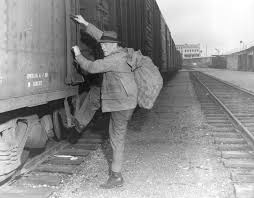In the early years of the depression when we lived in Akron my father lost his job. Living was hard for those who were out of work since there was no Social Security or food stamps – only soup kitchens in some of the cities. My mother told of the time she was pushing me around in a stroller and spotted an old potato lying on the sidewalk. She wanted to pick it up but was afraid someone would see her and thus discover that we were poor. Fortunately for us we were soon able to move in with my grandparents in Randolph. They had a grocery store and were relatively well off, so I never experienced the hunger that many people suffered at the time.
Randolph is located on US Route 224 between Atwater and Akron. This road passed in front of the Lang family business. Randolph is about 5 miles from Atwater which has a busy rail line, and trains passed through there every day. During the depression there were many men looking for work, and some were hitching rides on freight trains. Since there were possible jobs in the rubber factories these “hitch-hikers” sometimes jumped off the train in Atwater and walked into Akron, a distance of about 20 miles. For food these transients depended on the generosity of people living in the houses or stores that they passed. They often were carrying all of their worldly possessions, including pots, pans, skillets, bedrolls, etc. Many had these articles in a cloth feed sack hung over their shoulder, and some had pots and pans hung under their coats so they looked like penguins walking down the road with their arms stuck out at an angle. The utensils banging together under their coats announced their presence as they walked.
Most of these people were hungry, and Grandma Lang would never refuse food to a hungry person. Many times I would see one sitting on the front steps eating a sandwich. It was a sign of the times.
Later Dad obtained a job and we moved into a house next door to the Langs. On one occasion he invited a beggar into the house to sit at our table during dinner. After having a fine meal of pork, mashed potatoes and sauerkraut the man was feeling rather prosperous. When dinner was finished he thanked us for the meal. He then tilted his chair back on its rear legs, tucked both thumbs under his armpits, and asked:
“Does anyone know where a man could buy a small farm around here?”
Now here was a man who didn’t have a dollar but was too proud to admit it – even to himself. My dad saw the humor in this and told the story many times about the penniless beggar who wanted to buy a small farm.
